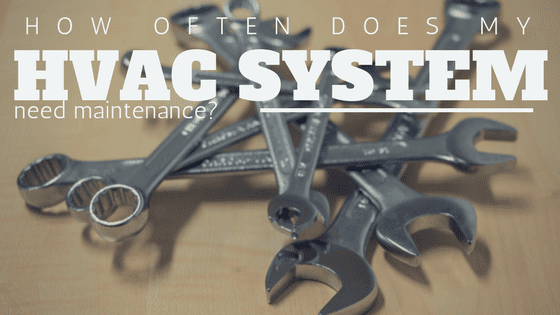As HVAC systems run, dust and dirt collect on different system components. Accumulation of dirt will eventually reduce the cooling capacity of the system. The unit will need to work harder in order to maintain the humidity and temperature at the desired levels. In addition to increasing energy use, the added strain on the HVAC system will accelerate the wear and tear of various components, reducing their life span. As you can see, HVAC maintenance is a must.
One way to avoid premature failure due to extra strain is to have your HVAC system maintained regularly by professional technicians. Although preventative HVAC maintenance is critical to the overall performance and service life of your equipment, how often you should maintain your system can be confusing at times.
To shed some light on this topic, we have decided to write the current blog post that explains the frequency of specific HVAC maintenance activities.
HVAC Maintenance Tasks
HVAC system manufacturers recommend maintenance operations to be scheduled twice a year, in the spring and in the fall, in order to avoid problems during the hottest and coldest months.
However, the frequency of HVAC maintenance activities should be determined in conjunction with facility-specific variables, such as day-to-day business operations and traffic flow in the building, and the local environmental factors, including outdoor temperatures, relative humidity, pollution, and corrosives (e.g. salt air in marine environments). As an example, the HVAC system in an industrial facility, which is subjected to harsh operating conditions, needs to be inspected and serviced more frequently than the system in a small commercial building.
HVAC system manufacturers also recommend inspections, maintenance, and repairs to be carried out by qualified technicians. Damage to equipment caused by improper installation, inadequate maintenance, or service procedures being performed by a non-certified HVAC technician is not covered under warranty.
Now, let’s take a look at how often different HVAC system parts and components should be inspected and serviced.
Air Filters
One simple maintenance task that can keep your HVAC system operating at peak performance is to replace its filters at least once a month, especially if the unit is in constant use. When the air filters get clogged with dust and dirt, the system needs to work harder in order to produce the same amount of cool air. As explained above, this will increase your energy bills and reduce the service life of different components, including the compressor. Dirty air filters also harbor contaminants that can enter the duct system and be circulated inside the building.
Evaporator and Condenser Coils
Even if the filter is replaced once a month, the evaporator coil will still collect dust and debris. This will impair the heat absorption capacity of the coil, with a negative impact on the overall efficiency of the system. The outdoor condenser coil will also become very dirty. Dirt buildup will reduce airflow and prevent the coil from releasing heat efficiently.
Cleaning both the evaporator and condenser coils annually is an important part of maintaining your HVAC system, reduce energy bills, and prolong equipment life. Also, keeping the area around the outdoor condenser unit free of dirt, debris, and foliage will allow for proper airflow, improving condenser performance.
Air Ducts
Even the most efficient air filters cannot catch every particle of dust. The dust and other contaminants that build up over time in the duct system will adversely affect the efficiency of your HVAC unit. These contaminants combined with moisture can also provide a breeding ground for allergens, mold, and bacteria. As allergens, mold spores, and other particles will eventually end up circulating throughout the entire building, they can cause indoor air quality problems.
To keep your HVAC system running efficiently and maintain adequate air quality in your facility, supply and return air ducts should be professionally inspected at least once every two years. If different particles are discharged from the vents and/or contaminants are observed in the air ducts, the cleaning of the entire air duct system is recommended.
Drain Line
One of the main functions of your HVAC system is to remove moisture from the air. The moisture collects as condensation on the evaporator coil and then drips into a condensate drain pan, which is connected to drain pipes. The condensation created by the system is often filled with dust and dirt particles. This can produce a thick sludge that collects on the pipes, constraining the passage of fluid. A technician should check the drain pipes and pan at least once a year in order to ensure they’re draining properly.
Depending on where the air filters and ducts are located in your building, HVAC system maintenance tasks might need to be planned around a particular operational schedule. Now, if you need HVAC system maintenance or repair, make sure that you contact a certified HVAC technician.












